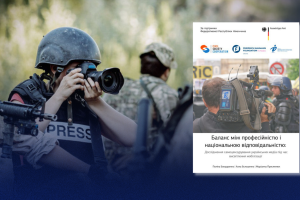The nationwide public opinion survey in Ukraine was conducted by the Ilko Kucheriv Democratic Initiatives Foundation jointly with the Razumkov Center sociological service on May 19-25, 2018 in all regions of Ukraine excluding the Crimea and occupied territories of the Donetsk and Luhansk oblasts. Exactly 2,019 respondents were polled aged 18 years and older. The theoretical sample error does not exceed 2.3%.
Financing for the survey was provided by the project ENGAGE program for promoting civic activity with financial support from the U.S. Agency for International Development (USAID) and implemented by Pact Ukraine.
For comparison, nationwide survey results were used that was jointly conducted by the Ilko Kucheriv Democratic Initiatives Foundation and the Razumkov Center sociological service on December 15-19, 2017.
- An absolute majority of the population (83%) believes that the fight against corruption in Ukraine is not successful, with 50% saying it is a total failure. Nine percent perceive the fight against corruption as successful, with only 1% saying this fight is a complete success. Compared with December 2017, the share of positive assessments shrunk by 6% and the share of negative assessments rose by 3%.
- A significant portion of the population (48%) do not see any institution that is actively fighting corruption in Ukraine. The remaining portion of the population views as actively combating graft foremost the media and journalists (26%), and anti-graft civil society organizations (18%). Next is the National Anticorruption Bureau of Ukraine (11%), the public (10.5%), individual politicians and civic activists (10%), and Western countries (6%). A very insignificant percentage of the population said that among the active corruption fighters are: the SBU (5%), Specialized Anticorruption Prosecutor’s Office (5%), National Agency on Corruption Prevention (4%), Prosecutor General’s Office (4%), President (4%), Police (3%), government and ministries (2%), Verkhovna Rada (2%), local governments (1.5%) and courts (1%).
- None of the institutions that should fight corruption received a positive grade concerning the effectiveness of this effort. The National Anticorruption Bureau of Ukraine received the most positive grade, but this is only 15% of that share; 13% polled said the SBU is effective in fighting corruption, the National Police– 10%, Prosecutor General’s Office of Ukraine – 9%, Specialized Anticorruption Prosecutor’s Office and National Agency on Corruption Prevention – 6%, and courts – 4%. The most negative grades were given to the courts (79%), Prosecutor General’s Office (75%), and National Police (74%). At the same time a significant share of the population could not provide an assessments of these bodies (from 16% regarding the National Police to 34% for National Agency on Corruption Prevention).
- Among the factors, according to the public, that most hinders the National Anticorruption Bureau of Ukraine to carry out its work well is in the first place the absence of political will to fight corruption (44%); and additional 33% named flaws in legislation, 21% named resistance from other law enforcement bodies, 23% – an unreformed judicial system, 22% named corruption inside NABU, and 21% named society’s lenient attitude towards corruption. Only 19% are certain that actually nothing prevents NABU from combating corruption.
- A majority of the population (53%) supports such a method of fighting corruption whereby a special agent offers a bribe to a public official, while 27% oppose the practice and 20% were undecided. This correlation remained practically unchanged compared to December 2017.
- Most trust in forming an anticorruption court was given to representatives of anti-corruption civil society groups (47%) and Western experts (38%). Significantly less trust for carrying out this task was given to national deputies of the Verkhovna Rada (13%), judges from bodies of judicial self-governance (9%), and Presidential representatives (5%). Compared with the end of 2017, the distribution of opinions on these questions almost did not change with the exception of somewhat increased trust toward anti-graft civil society groups (from 41% to 47%).
- Preference towards having representatives of anti-graft organizations and Western experts form the anticorruption court were given by voters of all political forces and regions of Ukraine.
- On the question of what specifically are citizens ready to do to combat corruption, an overwhelming majority polled (73%) named refusal to give a bribe. The other remaining options were chosen significantly less: informing law enforcement bodies – 19%, reporting of corruption cases to the mass media, on blogs and social media – 17%, complaining to government bodies on corruption cases at other agencies – 16%. And 13% said in principle they will not do anything.
- The actual percentage of those who did any of the aforementioned acts to fight corruption turned out to be scanty and did not exceed 2%. One exception is that 53% did not give a bribe in the last year, which is 20% less than their declared readiness not to.
- An overwhelming majority of citizens (73%) believe that judicial reform is going unsuccessfully (moreover, 43% believe it is a complete failure); only 10% said that the reform is going successfully.
- Negative grades are prevalent with regard to success in ridding the judicial body of dishonest judges: 43% of citizens do not see any success in this process, and 30% identified only the presence of single cases of success.
- On the question of selecting judges, the public most trusts civil society members (41% of those polled), Western experts (35%) and lawyers who did not work as judges (32%). The public in this matter least trusts the President (5%), Verkhovna Rada (5%) and bodies of judicial self-governance (7%).








